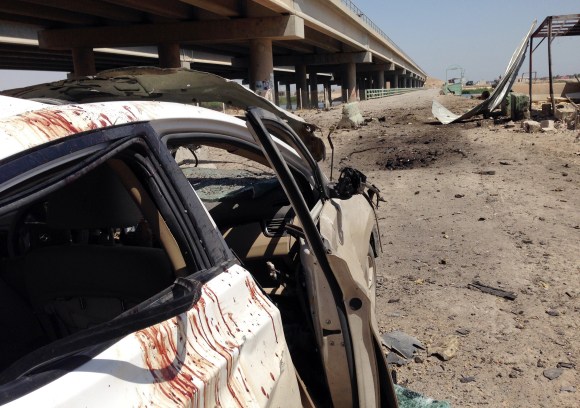Ned Parker previews the April 30th elections:
For months, suicide bombers have been dynamiting themselves in crowded Shiite markets, coffee shops, and funeral tents, while Shiite militias and government security forces have terrorized Sunni communities. The Iraqi state is breaking apart again: from the west in Anbar province, where after weeks of anarchic violence more than 380,000 people have fled their homes; to the east in Diyala province, where tit-for-tat sectarian killings are rampant; to the north in Mosul, where al-Qaeda-linked militants control large swathes of territory; to the south in Basra, home to Iraq’s oil riches, where Shiite militias are once more ascendant; to Iraq’s Kurds, who warn that the country is disintegrating and contemplate full independence from Baghdad.
More than 2,500 Iraqis have been killed since the start of the year, including nearly three hundred in the first ten days of April; in the capital itself, which has become a showcase for the country’s multiplying conflicts and uncontrolled violence, there have been several brazen attacks on government buildings, and a terrifying string of car bombings, including eight on April 9 alone.
It looks like Maliki, who is running for a third term, will remain in power:
With elections now two weeks away the prime minister appears confident.
One way his Shiite political opponents might challenge his bid to continue in office would be to form a ruling coalition with Sunnis and Kurds after the election. But despite their shared wish to replace Maliki, the competition among his Shiite opponents to claim his position, and the most lucrative governmental posts, may prevent them from coming together. Sunni political figures are in a similar battle for preeminence within their own community. Sunni candidates also face threats from members of ISIS, the Qaeda-linked group, who consider any participation in the election as traitorous. Deteriorating security conditions in the north and west are likely to limit Sunni voter turnout, and the electoral commission has already announced that some areas in western Anbar will not be able to cast ballots. In any case, a lengthy negotiation period will likely be required after the election to form a new government, during which Maliki, by virtue of his office, will continue to exercise the most power in the land.
In other Iraq news, the Committee to Protect Journalists (CPJ) has just named Iraq #1 on its “2014 Global Impunity Index,” which “spotlights countries where journalists are slain and the killers go free”:
With 100 journalists murdered in the last decade and 100 percent impunity, Iraq is the worst offender on the Impunity Index, a spot it has held since 2008, when CPJ first compiled the index. Nine new murders in late 2013 amid a resurgence of militant groups broke a two-year quiescence in fatal anti-press violence. Three of the victims, plus two media workers, were killed in a single attack when armed militants bombed and stormed Salaheddin TV station in Tikrit on December 23. Al-Qaeda affiliate Islamic State of Iraq and Sham (ISIS) claimed responsibility for the attack, according to news reports accusing it of warring against the Sunni people.
(Photo: A damaged car with blood trails is seen next to a crater at the site of twin suicide bombing the western Iraqi city of Ramadi, the provincial capital of Anbar province, on April 16, 2014. The attacks targeted two checkpoints killing five people and injuring 12 according to police and medical reports. By Azhar Shallal/AFP/Getty Images)
